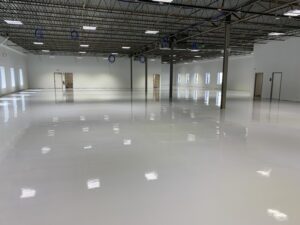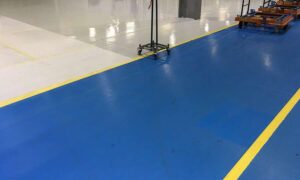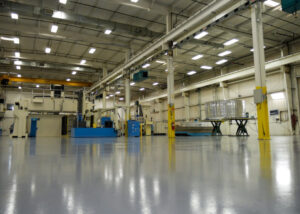Industrial Epoxy Flooring

- Competitive Pricing
- Experienced Contractors
- Strong Warranty
- Customizable options
- Dedication to Excellence
Industrial Epoxy Flooring Maintenance
Industrial epoxy flooring, despite its robustness and resilience, requires a regular maintenance routine to ensure its longevity and pristine appearance. The very nature of epoxy, with its seamless and non-porous finish, already minimizes the accumulation of dirt, dust, and microbes, making cleaning a relatively straightforward task. Generally, daily sweeping or dust mopping is recommended to remove loose debris. Depending on the level of foot or machinery traffic, wet mopping or using a soft-bristled mechanized scrubber with a mild detergent can be done weekly or bi-weekly. It’s essential to use cleaners that are pH-neutral, as acidic or alkaline products can degrade the epoxy coating over time. Spills, particularly of aggressive chemicals, should be addressed immediately to prevent potential staining or damage.
Beyond regular cleaning, periodic maintenance can help in keeping the floor’s luster and ensuring safety. Every few months, inspect the flooring for any signs of wear or damage, like chipping or peeling. While epoxy floors are exceptionally durable, high-impact or high-abrasion areas might show signs of wear over time. If these issues arise, timely repairs or re-coating can restore the floor’s integrity. Additionally, protective mats can be strategically placed in areas with frequent heavy equipment movement or dropping of tools to further extend the lifespan of the epoxy coating. With a proactive approach to maintenance, industrial epoxy flooring can remain aesthetically pleasing and functionally effective for many years.
Learn the Types of Industrial Epoxy Flooring We Install

- Self-leveling Epoxy Floors: These floors are especially popular for old, cracked, or damaged concrete surfaces. When applied, the epoxy spreads out evenly, creating a smooth, seamless finish. It’s ideal for warehouses, showrooms, and commercial garages because of its clean look and ease of maintenance.
- Epoxy Mortar Floors: This is the toughest epoxy floor system available. Composed of 100% solid epoxies and graded or quartz sand, it’s typically used to repair and fill cracks before laying other types of epoxy floors. Ideal for heavy-duty environments, such as manufacturing plants or garages.
- Quartz-Filled Epoxy Floors: These are a combination of stained quartz grains and high-performance epoxy polymer resins. The resulting surface is both beautiful and durable, making it perfect for spaces like cafeterias, restrooms, schools, and more, which require sanitary and decorative conditions.
- Anti-Static Epoxy Floors: In environments where a static charge could be dangerous, these floors come into play. They’re designed to dissipate any static electrical discharge, making them vital for pharmaceutical, electronic, or chemical manufacturing facilities.
- Epoxy Flake Floors: Comprising a colored epoxy base with colored flakes, granules, or chips sprinkled across, they offer a vibrant, mosaic-like, and textured finish. The rough texture provides slip resistance, making it popular for commercial spaces, clinics, and locker rooms.
- Polyurethane Floor Coatings: While technically not epoxy, polyurethane coatings are often mentioned in the same breath due to their similarities. They’re UV resistant, making them less likely to yellow over time when exposed to sunlight. They also offer excellent resistance against chemicals, abrasions, and impacts.
- Epoxy Terrazzo Floors: Renowned for their decorative touch, these floors combine epoxy resin with marble/granite chips or other aggregates. This type is often found in institutional facilities, such as schools or airports, due to its decorative appearance and long lifespan.
- Epoxy Antimicrobial Floors: Infused with antimicrobial agents, these epoxy coatings prevent microbial growth, offering a hygienic environment. This type is essential for healthcare facilities, labs, and food production plants.
- Epoxy Waterproofing Systems: Designed for both protection and aesthetics, these systems provide a waterproof barrier, making them ideal for basements, decks, and other areas exposed to moisture.
- High Solids Epoxy Floor Coating: With a higher percentage of solids, this type offers thicker coatings, increased durability, and a longer lifespan. Often utilized in commercial settings that demand a combination of aesthetics and resilience.
Industrial Epoxy Flooring Maintenance



